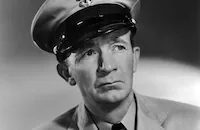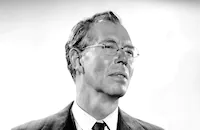Glory

Brief Synopsis
Cast & Crew
David Butler
Margaret O'brien
Walter Brennan
Charlotte Greenwood
John Lupton
Byron Palmer
Film Details
Technical Specs

Synopsis
In Kentucky, Agnes Tilbee's Fairwood Farms horse breeding operation has been reduced to a single trailer in which she lives with her teenaged granddaughter Clarabel. They have high hopes for their newest foal, but Agnes is disappointed to learn that the horse is a filly. Although a female horse has won the Kentucky Derby only once, Clarabel falls in love with the horse, which she names Glory, and plans to groom her to win the big race. Over the next months, Agnes and former trainer Ned Otis continue to feud over who is to blame for failing to enter a horse in a derby years earlier, while Clarabel boards Glory at the neighboring stable owned by Chad Chadburn. Chad, who is surprised at how lovely Clarabel has become, prefers her passion for horses to his wealthy society friends's disdain for his love of the stables. Six weeks later, Agnes sets out on the annual race tour with Clarabel, trainer Joe Page, and groom Alexander. Before they leave, Chad's girl friend, Candy Trent, scares the horses with her loud sports car, earning a scolding from Clarabel. At the first stop, they are joined by Ned, whom a rival owner, Grist, has hired to train his horse. Agnes dismisses him rudely, but when Ned overhears that she is having trouble paying her $50 feed bill, he presents Clarabel with a "birthday gift" of $50. Later, Clarabel learns that Agnes has put Glory up for auction in order to raise money for the farm and, horrified, races to put a stop to the sale. She interrupts the auction and is about to be thrown out when Chad and veterinarian Doc Brock come to her aid. As Chad breaks Glory with his own horses, Clarabel delights in the filly's speed and agility. With Fairwood Farms in desperate financial straights, Clarabel eagerly enters Glory into races, but the horse is not ready and repeatedly loses. After Agnes informs Clarabel that they cannot keep Glory, Ned offers to buy her, which prompts Agnes to decide that Glory must be worthwhile. Soon after, Chad invites Clarabel for a drive, and when Agnes sees her put on her best dress, warns her that the newspapers have announced Chad's engagement to Candy. During their ride, however, Chad assures her that the newspaper account is untrue. The next day, Chad invites Clarabel and Agnes to watch the race from his box seats, and shares their joy when Glory wins. Clarabel drops Glory off to get shod, but the horse soon disappears, and Agnes assumes that Ned has stolen her. She has merely wandered off, however, and soon shows up back at the farm with an injured foreleg. Months later, Glory is still lame, and Agnes can no longer afford to keep her. Certain that Glory is a champion, Clarabel enters her in the Kentucky Derby, despite the fact that she cannot raise the entrance fee. Chad invites them to dinner, where he reveals that he is going to visit Candy in California. When Candy returns to Kentucky, she flaunts a diamond ring and warns Clarabel to "run in her own class." Clarabel finds solace in singing to Glory, and when singer Hoppy Hollis wanders in to check out his new horse, he is entranced by Clarabel's pretty voice. He insists that she join him in his nightclub act, where they popularize the song "Glory," the profits for which Clarabel donates to the stable. Hoppy soon falls in love with Clarabel and presses her to join him on tour, but she demurs. After Chad's new trainer, Sobbing Sam Cooney, wins all of Agnes' money in a poker game, she admits to Joe that she has no choice but to close the farm and move to Brooklyn. The next day, Clarabel hears that Agnes has sold Glory to Chad, and furiously confronts Chad for having bought the horse without telling her first. Chad is dumbfounded until he realizes that Sam bought Glory without his permission, and orders the trainer to "lose" the horse back to Agnes. Sam does so in another poker game, but before Agnes can inform Clarabel, the girl packs up to go on tour with Hoppy. Agnes finds her at the nightclub, and as soon as Clarabel hears that Glory is once again hers, she returns to the farm. Agnes decides to move to Brooklyn alone, after which Clarabel hires Ned to train Glory for the Derby. They are almost defeated by the lack of the entrance fee, but all their friends band together to come up with the money, and Glory enters the race. Before the race, Clarabel tells Hoppy that if Glory loses, she will sign his contract. At the last moment, Agnes returns from New York to cheer Glory on, and all are overjoyed when the horse breaks ahead of the pack. Glory wins the race, and in the excitement, Hoppy and Candy grow attracted to each other. In the winner's circle, as Agnes and Ned make up, the announcer turns to Clarabel for a comment, but she is too busy kissing Chad to speak.

Director
David Butler
Cast

Margaret O'brien

Walter Brennan

Charlotte Greenwood

John Lupton

Byron Palmer
Lisa Davis
Gus Schilling
Hugh Sanders

Walter Baldwin
Harry Tyler

Leonid Kinskey
Paul E. Burns
Theron Jackson
Gene White
Swaps
Madge Blake
Syd Saylor
William Schallert
Mauritz Hugo
Crew
David Butler
Jack Byron
Wilfrid Cline
Albert S. D'agostino
Francis D'agostino
Walter Elliott
M. K. Jerome
Terry Kellum
Ted Koehler
John B. Mansbridge
Gene Markey
Peter Milne
Irene Morra
Frank Perkins
Phil Quinn
Darrell Silvera
Gertrude Wheeler
Earl Wolcott
Michael Woulfe
Norma Zimmer

Film Details
Technical Specs

Articles
Glory (1956)
With awkward taglines like "You'll Fall in Love as She Herself Falls in Love" and "She's a Treat for Every Heartbeat!", Glory, directed by David Butler from a screenplay by Peter Milne (based on an original story by Gene Markey), told the story of a young woman named Clarabel Tilbee (O'Brien), who raised a young filly named Glory to become a Kentucky Derby champion. Also in the cast are the reliable Charlotte Greenwood as O'Brien's feisty grandmother and Walter Brennan, who provides training for the horse and bickering romance for Greenwood.
This was not the comeback hit that O'Brien needed. Part of the problem was that the film was nothing new. There was the predictable romance where the plain but sweet girl wins the rich boy with the spoiled fiancée, and there is really little doubt whether or not the horse will win. Half-way through Glory, there are some musical numbers, with Margaret O'Brien being dubbed by Norma Zimmer, who would be much better known for her 22 years as The Champagne Lady with bandleader Lawrence Welk.
Glory was shot in Technicolor and Superscope, one of the many widescreen anamorphic processes popular in the 1950s. The production lasted little over a month, beginning on July 6, 1955 and ending in early August. Churchill Downs and Calumet Farms in Lexington were among the real locations used. Of particular interest is the archival footage from the real 1955 Kentucky Derby, which Willie Shoemaker won riding Swaps over his rival Eddie Arcaro on Nashua.
Hal Erickson of the All Movie Guide places some of the blame for the film's lack of success on poor handling by RKO Pictures, who had acquired the film from David Butler Productions. Glory premiered in Lexington on January 11, 1956, and like O'Brien's previous film, did not rate a review by the New York Times. Despite its failure, director David Butler ranked it among his favorites.
Producer: David Butler
Director: David Butler
Screenplay: Peter Milne (writer); Gene Markey (story)
Cinematography: Wilfred M. Cline
Art Direction: Albert S. D'Agostino, John B. Mansbridge
Music: Frank Perkins
Film Editing: Irene Morra
Cast: Margaret O'Brien (Clarabel Tilbee), Walter Brennan (Ned Otis), Charlotte Greenwood (Miz Agnes Tilbee), John Lupton (Chad Chadburn), Byron Palmer (Hoppy Hollis), Lisa Davis (Candy Trent), Gus Schilling (Joe Page), Hugh Sanders (Sobbing Sam Cooney), Walter Baldwin (Doc Brock), Harry Tyler (Beed Wickwire).
C-100m.
by Lorraine LoBianco
SOURCES:
Blum, Daniel Screenworld Vol. 7 1956
Erickson, Hal The All-Movie Guide
The Internet Movie Database

Glory (1956)
Quotes
Trivia
Notes
The film opens with voice-over narration describing the majesty of Kentucky's thoroughbred racehorses. Later, near the middle of the film, there is a montage during which the same narrator describes racehorse training. Arthur Hunnicutt was originally cast as "Ned Otis," but according to a July 14, 1955 Daily Variety news item, he quit the production after arguments with producer-director David Butler over "the way the role of a horse trainer should be interpreted." Modern sources state that Butler originally asked Debbie Reynolds to star in Glory, but she was unavailable. As noted in contemporary reviews, the Kentucky Derby race sequence used footage from the 1955 Derby. That race was won by a horse named Swaps, who played "Glory" in the film.
As noted in contemporary sources, portions of the films were shot on location in Kentucky at Calumet Farms, which was owned by the wife of writer Gene Markey. Hollywood Reporter news items add that other scenes were shot at the Rowland V. Ranch in San Fernando, CA. Although an October 1955 Los Angeles Examiner article stated that RKO planned to release the film for the Christmas season, it did not screen until January 1956. According to an November 11, 1955 Hollywood Reporter news item, the January 11, 1956 world premiere in Lexington, KY, was sponsored by Calumet Farms and benefited the University of Kentucky Clinic for Spastic Children. Hollywood Reporter news items add Sandra Rogers, Gary Marshall, Jimmy Karath and Arthur Little, Jr., to the cast, but their appearance in the final film has not been confirmed. Modern sources add Jeffrey Sayre and Yvonne Ginest to the cast.















